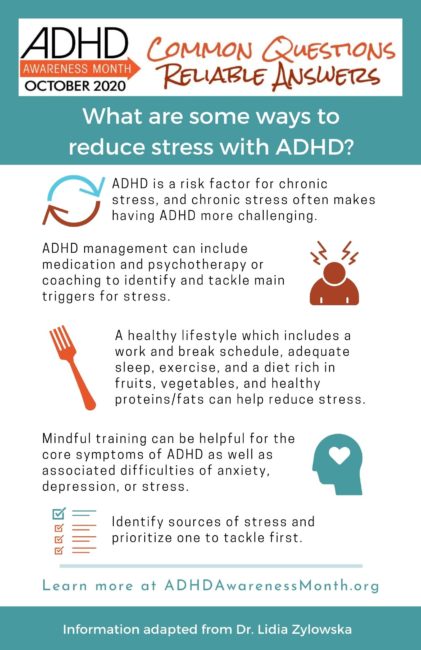Having ADHD often means living with an increased stress or processing stress in unique ways. The ADHD symptoms, such as trouble focusing, disorganization, forgetfulness, impulsive actions and other executive function problems, can get in the way of effective problem-solving, managing emotions, or feeling in control of one’s life. The difficulties can set up a stage for feeling overwhelmed or discouraged. Research shows high rates of family or marital conflict and stress, academic or job underachievement, financial difficulties and increased burden of other mental and physical disorders in ADHD (1). Overall, ADHD is a risk factor for chronic stress, and chronic stress often makes having ADHD more challenging.
Strategies to manage stress
If you have ADHD and are feeling a great deal of stress because of it, there are ways to manage it.
Medication can minimize core ADHD symptoms of inattention or restlessness, and ADHD-focused psychotherapy or coaching can help identify and tackle your main triggers for stress. If you are feeling unfocused, overwhelmed and getting in your own way, starting or optimizing these ADHD treatments can help you feel more in control of your day and relieve a great deal of stress. At the same time, it is important to have a healthy lifestyle and learn some strategies for stress resilience.
If your daily routine is irregular or not so healthy, the stress can be addressed by setting up a work and break schedule, having adequate sleep, and exercising. Eating a Mediterranean style diet rich in fruits, vegetables and healthy protein and fats may also help offset ADHD symptoms and support overall mental health (2, 3).
Exposure to nature or green spaces has also been found helpful with ADHD symptoms (4) and is known to support stress coping. Lifestyle changes should be tackled one at a time so they are not overwhelming.
Mindful awareness or mindfulness training is also proving helpful for the core ADHD symptoms as well as associated difficulties of anxiety, depression or stress (5). This training uses meditation practice and brief awareness exercises in daily life to train attention, balance negative emotions and increase experience of positive emotions such as self-compassion. The mindful practice of pausing to check in and look inward, can help you recognize signs of stress such as tight shoulders, or thoughts of overwhelm, and address it before the tipping point. Breathing exercises and mind-body movement often encourage relaxation response and can mitigate the in-the-moment feeling of overwhelm or stress.
Last but not least, effective communication, such as good listening, being assertive and clear about your needs, setting self-boundaries or navigating conflict can relieve relationship stress in families.
Bottom line:
Identify your sources of stress and prioritize which one you want to tackle first. If unsure or stuck, ask a friend/partner for help or engage with an ADHD professional. Acknowledge with self-compassion that tackling stress may not be easy but even a small first step can create an upward spiral.
About the Author

Lidia Zylowska MD is an Associate Professor at the University of Minnesota Department of Psychiatry and Behavioral Sciences. She led the development of the Mindful Awareness Practices (MAPs) for ADHD program and is an author of Mindfulness Prescription for Adult ADHD.
References
1 Kooij SJ, Bejerot S, Blackwell A, et al. European consensus statement on diagnosis and treatment of adult ADHD: The European Network Adult ADHD. BMC Psychiatry. 2010 Sep 3;10:67. doi: 10.1186/1471-244X-10-67. PMID: 20815868; PMCID: PMC2942810.
2.Ismael San Mauro Martín, Javier Andrés Blumenfeld Olivares, Elena Garicano Vilar, et al (2018) Nutritional and environmental factors in attention-deficit hyperactivity disorder (ADHD): A cross-sectional study, Nutritional Neuroscience, 21:9, 641-647, DOI: 10.1080/1028415X.2017.1331952
3Camille Lassale et al. Healthy dietary indices and risk of depressive outcomes: a systematic review and meta-analysis of observational studies, Molecular Psychiatry (2018). DOI: 10.1038/s41380-018-0237-8
4 Kuo FE, Taylor AF. A potential natural treatment for attention-deficit/hyperactivity disorder: evidence from a national study. Am J Public Health. 2004;94(9):1580-1586. doi:10.2105/ajph.94.9.1580
5Mitchell, J. T., Zylowska, L., & Kollins, S. H. (2015). Mindfulness meditation training for attention-deficit/hyperactivity disorder in adulthood: Current empirical support, treatment overview, and future directions. Cognitive and Behavioral Practice, 22(2), 172–191.

